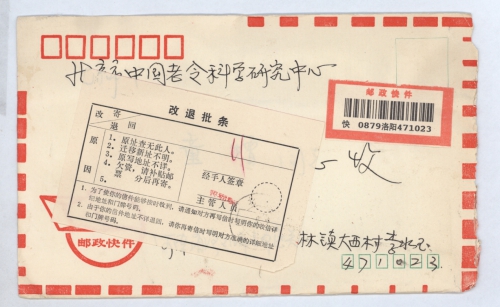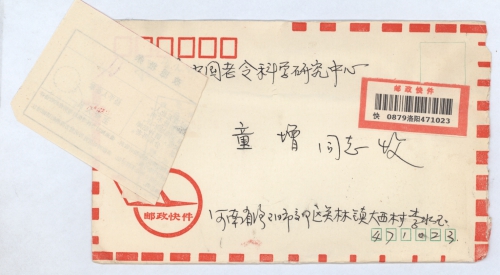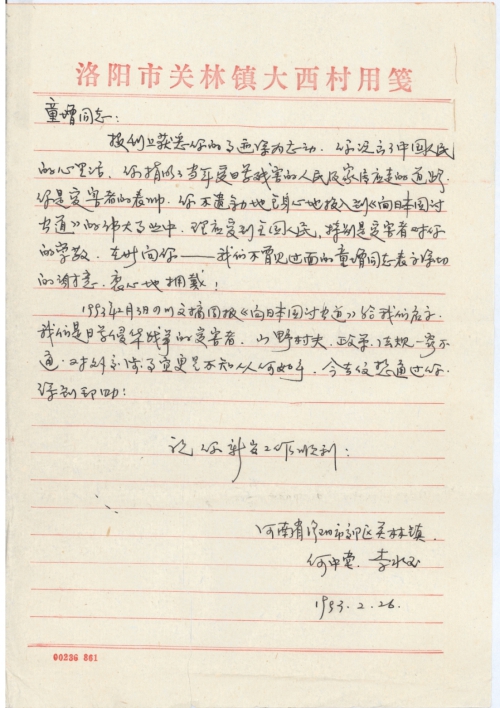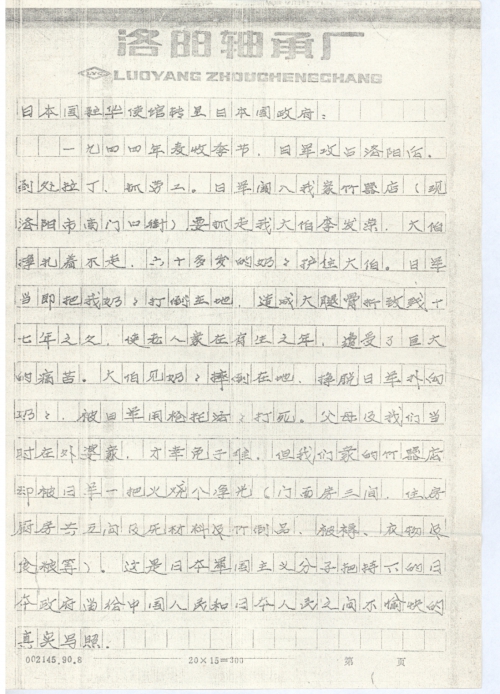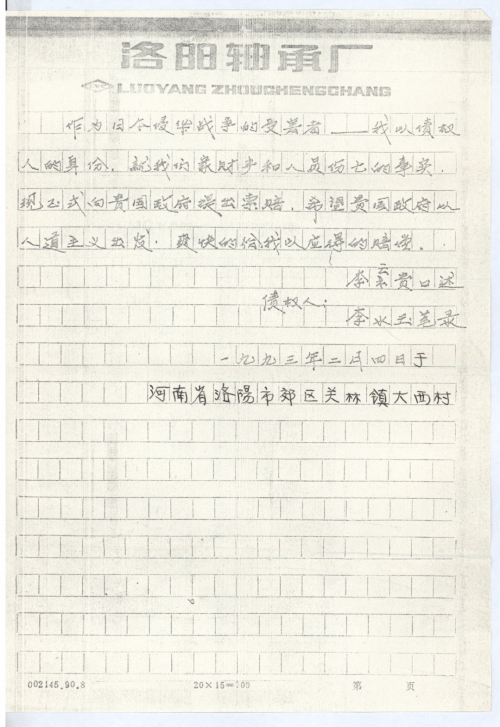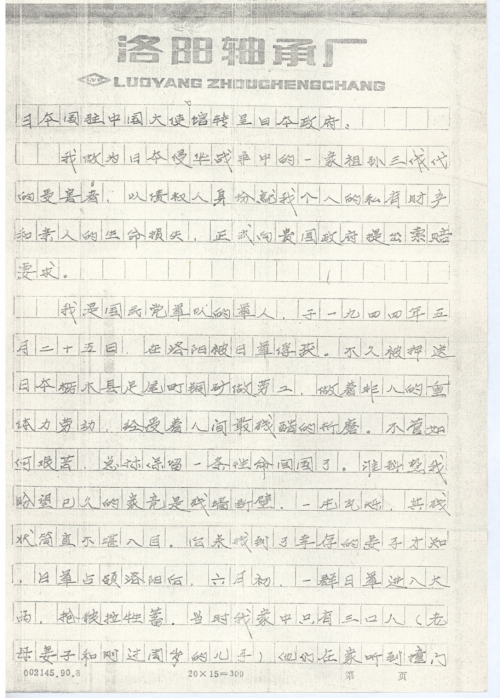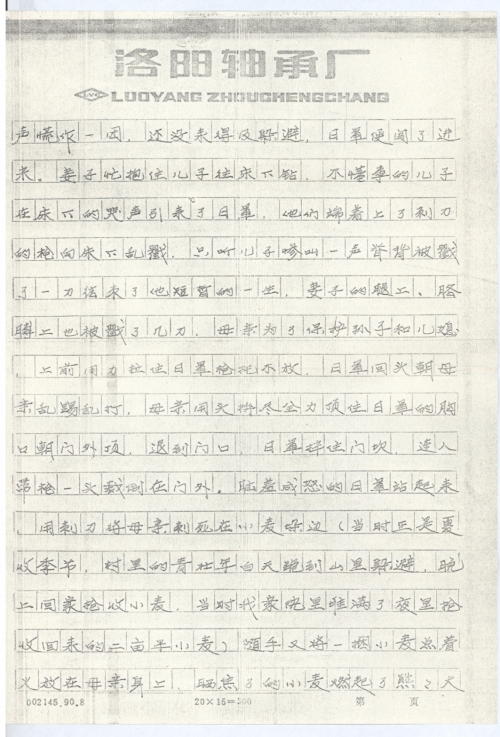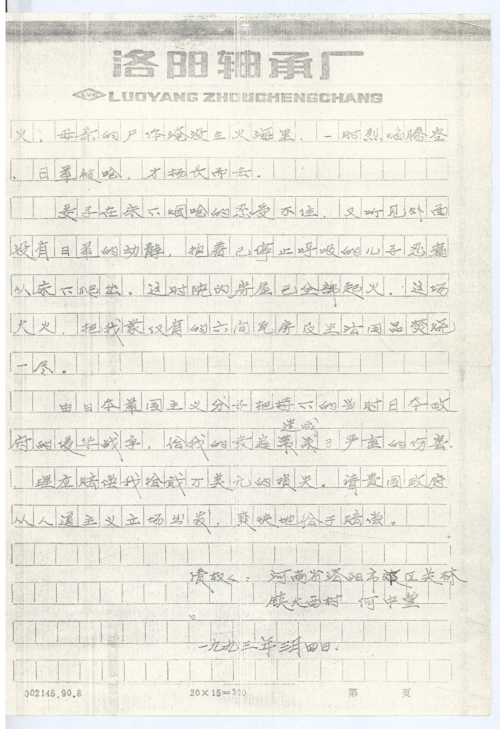Date of letter:1993-02-26
Address of author:Luoyang City, Henan Province
Date of event:1944
Location of event:Luoyang City, Henan Province
Name of author:Li Shuiyu, He Zhongtang (sending letters)
Name(s) of victim(s):Li Farong (Li Yungui’s uncle), He Zhongtang and his family
Type of atrocity:Murders, Others, Slave Laborers(MU, OT, SL)
Other details:In 1944, the Japanese soldiers broke into my (Li Yungui’s) family and wanted to forcibly catch my uncle Li Farong. My grandmother went to prevent, but she was beaten by the Japanese soldiers and was permanently disabled. My uncle was beaten to death. Our houses were burned down. On 25 May, 1944, I (He Zhongtang) was captured by the Japanese soldiers in Luoyang and then escorted to Japan to do hard labor. Every day I suffered inhuman workload and most cruel torture. When I returned the motherland, I found my home was already in ruins. The Japanese invaders massacred my family and burned my home. In summary, we require the Japanese government to make apology and compensation for the victims.
Comrade Tong Zeng:
I’ve learned of your act from the newspaper and I’m so touched. You’ve spoken what’s in the mind of Chinese people and pointed a direction for the victims of the invading Japanese army and their family members. As a representative of victims, you are fully committed to the great cause of Pursuing Justice Against Japan. You deserve the respect of all Chinese people, especially the victims. Here, I’d like to express my sincere gratitude and admiration to you, comrade Tong Zeng, although we have never met.
Inspired by the article Pursuing Justice Against Japan from Sichuan Digest Weekly of February 3, 1993, we’ve realized we are victims of Japan’s war of aggression against China. But we are farmers and know nothing about laws and policies, let alone the handling of foreign affairs. So I am sending a letter to get your help.
Best wishes to your work.
Guanlin, Luoyang, Henan
He Zhongtang, Li Shuiyu
February 26, 1993
To the Japanese government in care of the Japanese embassy in China:
In the reason of reaping wheat in 1944, the Japanese army was busy capturing laborers after occupying Luoyang. They barged in my family’s bamboo shop (now Nanmenkou Street, Luoyang) and tried to take away my eldest uncle Li Farong. He refused and my grandmother of over 60 tried to protect him. The Japanese soldiers beat my grandmother on the ground and caused a fracture to her thigh. My grandmother was thus disabled for 17 years and suffered great pain in those years. Seeing my grandmother fall down on the ground, my eldest uncle got rid of the Japanese soldiers and ran to my grandmother. He was beaten to death by the Japanese soldiers with the butts of rifles. My parents were at my maternal grandmothers’ house, so they survived, but our bamboo shop (including 3 front rooms, living room, kitchen, bamboo products, clothes, quilts and grain, etc.) was burned to ruins by the Japanese army. This is an unpleasant fact that the Japanese government controlled by Japanese militarists left to Chinese and Japanese peoples.
As a victim of Japan’s war of aggression against China and a creditor, I formally make a claim for compensation against your government for causing life and property losses to my family and hope that your government will readily compensate me from the perspective of humanitarianism.
Creditor: Dictated by Li Yungui
Recorded by Li Shuiyu
February 4, 1993
Daxi, Guanlin, Luoyang, Henan
To the Japanese government in care of the Japanese embassy in China:
As a victim of Japan’s war of aggression against China and a creditor, I formally make a claim for compensation against your government for causing life and property losses to my family.
I was a soldier of the Kuomintang army and captured by the Japanese army in Luoyang on May 25, 19445. Soon, I was escorted to Copper Mine at Ashio-cho, Tochigi Pref., Japan to be a forced laborer, where I did heavy work and suffered the cruelest torture. Luckily, I survived and returned to my motherland. But who would’ve thought that the home I desired became a pile of ruins and a tragic sight to see. Later, I found my surviving wife and knew what happened. In early June after the Japanese army occupied Luoyang, a group of Japanese soldiers entered Daxi to rob grain and livestock. At that time, there were only 3 people (my mother, wife and son who just turned 1 year old) in my family. They panicked when they heard people bumping the door and had no time to hide before the soldiers barged in. My wife embraced my son in her arms and hid under the bed. But my innocent son cried and attracted a Japanese soldier. He poked under the bed using a bayonet. My son was stabbed in the back, gave a tragic scream and died. My wife was also stabbed in the leg and arm. My mother firmly held the butt of the bayonet to protect her grandson and daughter-in-law, so the soldier kicked at her. My mother tried her best to push the soldier out of the door by putting her head against the soldier’s chest. The soldier stepped back at the door, was bumped by the threshold and fell down outside the door along with his bayonet. The angry soldier stood up and bayoneted my mother beside the wheat pile (It was then summer and a harvest reason. Young people of the village went hiding in the mountains during the daytime and harvested wheat in the evening. 2.5 mu (1 mu is about 667 square meters) of wheat was harvested and piled up in our yard). Then, the soldier set fire to a bundle of wheat and put it on my mother. The wheat pile was kindled, and the big fire swallowed my mother’s body. The soldier was choked by the thick smoke and left.
My wife suffered the smoke under the bed and climbed from under the bed, holding my son who had stopped breathing until she heard no sound outside the door. At that time, all houses were on fire. The big fire burned down my family’s all 6 tile houses and household items.
I should be compensated 120,000 USD for my family’s great losses caused by Japan’s war of aggression against China launched by the then Japanese government controlled by Japanese militarists. Hopefully, the current Japanese government will readily compensate me from the perspective of humanitarianism.
Creditor: Daxi, Guanlin, Luoyang, Henan
He Zhongtang
March 4, 1993














